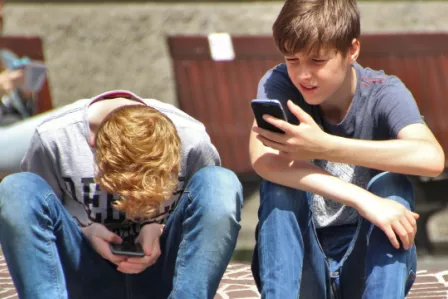When children are taking the step of creating an account on social media without you knowing, the best piece of advice for you is to get curious, not furious. Use this as an opportunity to ask some key questions about the particular social media platform they are on and what they have been doing on it.

It is also important not to confiscate the device straight away, as many young people admit that the main reason why they do not tell their parents about a problem online is due to worry that they will take their phone, tablet or access to the internet away. Ensure your child feels they can come to you without fear of judgement or punishment if anything worries or upsets them online. Once you have had this conversation, you can move on to the next steps, whether deleting the account or working together to ensure your child is safe online.
Take time to review the profile they have set up and discuss whether their privacy settings and the content they post are appropriate. This can be an excellent chance to discuss why they want a social media account and gives you time to explain why it may not be suitable for them to do so.
It is also key to be prepared to hear the argument of “everyone else is on it”. As children get older, it can seem like the most important thing to be on each new site or app that is available and children can sometimes feel like they are the only ones being left out. However, it can be helpful for parents to dig a little deeper.
Remember that just because everyone at school is talking about a site, it does not necessarily mean that they are all using it. Try talking to other parents and asking if their children are using it. It is easy for these kinds of things to get exaggerated and you may find that far fewer of your children’s classmates are actually using it than it may have initially appeared.
Creating a family agreement can also be a great way to share your expectations around internet use with your children. You can explore which apps they are allowed to use, set expectations around how they set up their profiles and even set a date when this will be reviewed by all of your family.
Find out more about the work of the Maltese Safer Internet Centre, including their awareness raising, helpline, hotline and youth participation services – or find similar information for Safer Internet Centres throughout Europe.
When children are taking the step of creating an account on social media without you knowing, the best piece of advice for you is to get curious, not furious. Use this as an opportunity to ask some key questions about the particular social media platform they are on and what they have been doing on it.

It is also important not to confiscate the device straight away, as many young people admit that the main reason why they do not tell their parents about a problem online is due to worry that they will take their phone, tablet or access to the internet away. Ensure your child feels they can come to you without fear of judgement or punishment if anything worries or upsets them online. Once you have had this conversation, you can move on to the next steps, whether deleting the account or working together to ensure your child is safe online.
Take time to review the profile they have set up and discuss whether their privacy settings and the content they post are appropriate. This can be an excellent chance to discuss why they want a social media account and gives you time to explain why it may not be suitable for them to do so.
It is also key to be prepared to hear the argument of “everyone else is on it”. As children get older, it can seem like the most important thing to be on each new site or app that is available and children can sometimes feel like they are the only ones being left out. However, it can be helpful for parents to dig a little deeper.
Remember that just because everyone at school is talking about a site, it does not necessarily mean that they are all using it. Try talking to other parents and asking if their children are using it. It is easy for these kinds of things to get exaggerated and you may find that far fewer of your children’s classmates are actually using it than it may have initially appeared.
Creating a family agreement can also be a great way to share your expectations around internet use with your children. You can explore which apps they are allowed to use, set expectations around how they set up their profiles and even set a date when this will be reviewed by all of your family.
Find out more about the work of the Maltese Safer Internet Centre, including their awareness raising, helpline, hotline and youth participation services – or find similar information for Safer Internet Centres throughout Europe.
- well-being social media
Related content
- < Previous article
- Next article >












